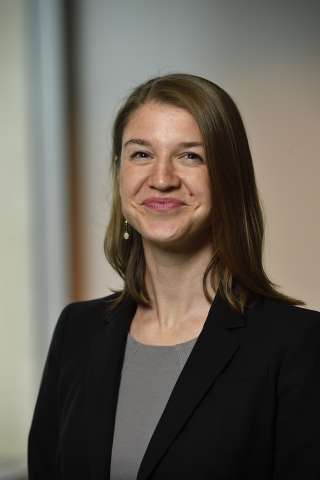
Food is the Connecting Thread: Q&A with Bloomberg Fellow Susan Kornacki
March 6, 2020
When Susan Kornacki was 6, she saw a cross-section of a landfill in a book called Earthsearch. She never forgot how clearly each layer of preserved material stood out: plastic bags, glass, electronics, food remnants. “What really struck me was how a hamburger appeared to be frozen in time, barely decomposing,” she says. “That was when I first understood that the garbage we throw away goes somewhere, and when it is disposed of, it is stored for an undetermined amount of time out on the surface of the earth somewhere.”
The pivotal role that the food system plays in environmental health has driven Susan’s career. As co-chair of the Environmental Impact Working Group of the Montgomery County Food Council in Maryland, Susan leads a group of more than 20 professionals and community members in mitigating the local food system’s environmental impact, supporting such activities as county-wide composting programs, food waste reduction, and sustainable agriculture practices. Susan also contributes to strategic planning for the Council, coordinates community events on such topics as food-waste composting, and builds partnerships to bolster the impact and reach of the Council’s work.
We spoke with Susan about the deep connections between the environment, the food system, and public health, and how being a Bloomberg Fellow will help further her work.
What drives you, and how did this bring you to your interest in public health?
I am driven by the conviction that humans have done terrible damage to the planet, and we have a responsibility as a species to undo as much of that damage as we can, and to make amends. Over several years working on tree planting programs, composting initiatives, and water quality protection, I’ve realized that food is the connecting thread for me: food production steers countless land management decisions worldwide, while food distribution often occurs inequitably, leaving many communities food insecure. Food production leans hard on our finite water supply, and the local and global systems currently in use will need to adapt as our population grows and our climate changes.
What public-health related work have you done that you’re most proud of?
I am proud of my work planting and caring for trees in New York City through the MillionTreesNYC initiative at the New York City Parks Department. I look back on those mornings spent standing on sidewalks, talking with New Yorkers about street trees and the many benefits they provide to our communities, and I realize that was how it all started for me. I am really proud of the conversations I had with people who felt a range of emotions toward their trees—indifference, curiosity, annoyance, excitement, gratitude. In those conversations, I learned about the challenges and barriers that people were dealing with on the neighborhood level. I used what I learned to shape and change our programs, so that MillionTreesNYC could support New Yorkers in implementing community beautification projects that both included and went beyond the urban forest: murals, block cleanup days, youth recognition events, tree watering parties.
The MillionTreesNYC program prioritized tree planting in neighborhoods with the fewest street trees, worst air quality, and highest number of kids suffering from respiratory issues. Knowing that, and spending time in many neighborhoods over the years, shaped my thinking. Now, I’m a little better at recognizing signs of historic disinvestment in communities, and my hope is to learn about effective strategies and policy changes that can address the results of that disinvestment head-on.
What question or problem in your community keeps you up at night?
What is in the air we are breathing? Who has access to healthy food and who doesn’t, and why?
How is the Bloomberg Fellows Program helping you to tackle that problem? What impact do you hope you to make as a Bloomberg Fellow?
Throughout my career I’ve focused on food systems work and environmental protection on a program level. Through the Bloomberg Fellows Program, I am gaining the tools I need to work on a systemic level. As a Bloomberg Fellow, I hope to make stronger ties between environmental sustainability and public health work that focuses on food systems and food security.
Tell us something surprising or unexpected about yourself or your work.
I think people see me as an innately optimistic, cheerful person, but I hit a point about a year ago when I began to lose hope. Everywhere I looked, I saw systems of entrenched power holding people back and determining our health outcomes long before we have a say in it. I leaned on my support network and drew strength from conversations with other people who see those those same systems and work hard every day to change them. My optimism has a new shape now. It is formed by my belief that making changes takes time, and we all have to support each other when the going gets really tough and the work starts to feel limitless.
Connect With Us
Receive all the latest news from the Initiative by signing up for the American Health Dispatch newsletter, subscribing to the American Health Podcast, and subscribing to our YouTube channel.
Contact Us